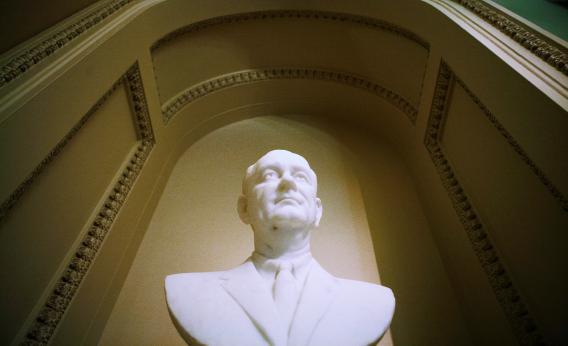I think it’s fair to say that Lyndon B. Johnson’s administration marked a high water mark of American liberalism on the domestic economic front. We got Medicare, Medicaid, and the War on Poverty out of his time in office alongside the Civil Rights and Voting Rights Act. Yet I think most people would be interested to read his 1964 State of the Union Address and find that he engaged in all the rhetorical and tactical tics that liberals hate about Barack Obama:
For my part, I pledge a progressive administration which is efficient, and honest and frugal. The budget to be submitted to the Congress shortly is in full accord with this pledge.
It will cut our deficit in half–from $10 billion to $4,900 million. It will be, in proportion to our national output, the smallest budget since 1951.
It will call for a substantial reduction in Federal employment, a feat accomplished only once before in the last 10 years. While maintaining the full strength of our combat defenses, it will call for the lowest number of civilian personnel in the Department of Defense since 1950.
And:
I therefore urge the Congress to take final action on this bill by the first of February, if at all possible. For however proud we may be of the unprecedented progress of our free enterprise economy over the last 3 years, we should not and we cannot permit it to pause.
In 1963, for the first time in history, we crossed the 70 million job mark, but we will soon need more than 75 million jobs. In 1963 our gross national product reached the $600 billion level–$100 billion higher than when we took office. But it easily could and it should be still $30 billion higher today than it is.
Wages and profits and family income are also at their highest levels in history–but I would remind you that 4 million workers and 13 percent of our industrial capacity are still idle today.
We need a tax cut now to keep this country moving.
It’s true that unlike Obama, LBJ makes specific reference to Keynesian concepts like the output gap (“it easily could and it should be still $30 billion higher”) and excess capacity (“4 million workers and 13 percent of our industrial capacity are still idle today”) but lurking amidst the calls for expanded health insurance, anti-poverty action, and civil rights is this basic commitment to trying to get himself perceived as a foe of high taxes and excessive spending.
